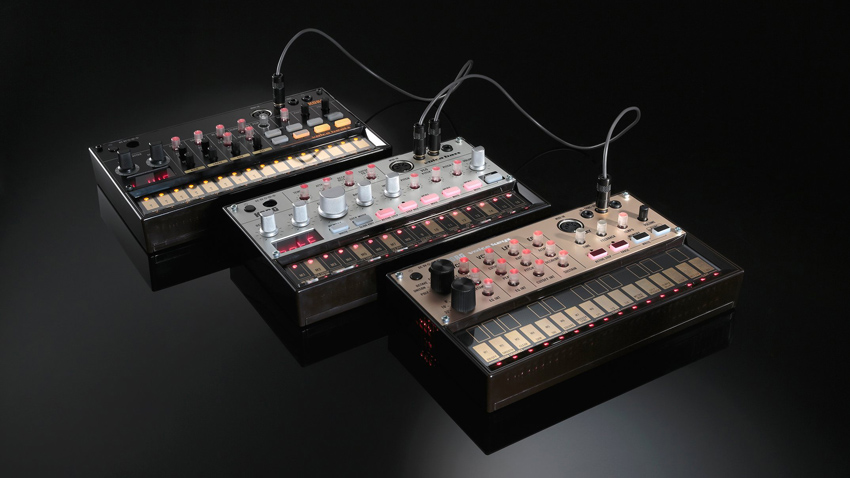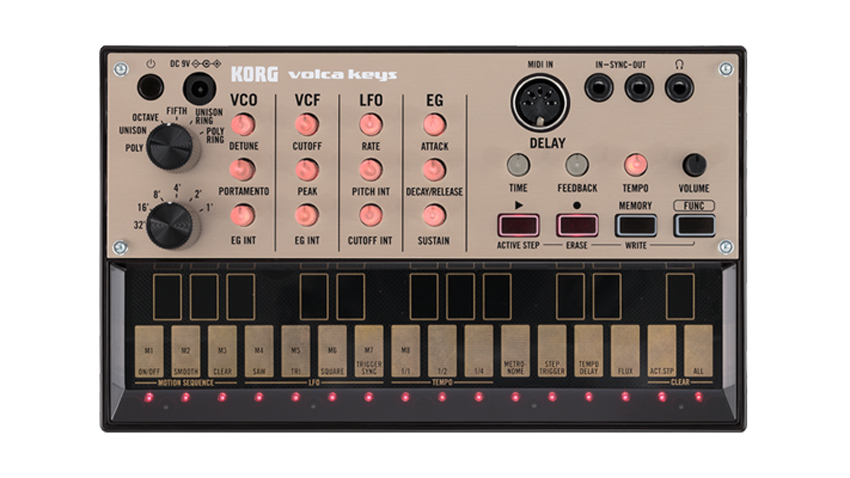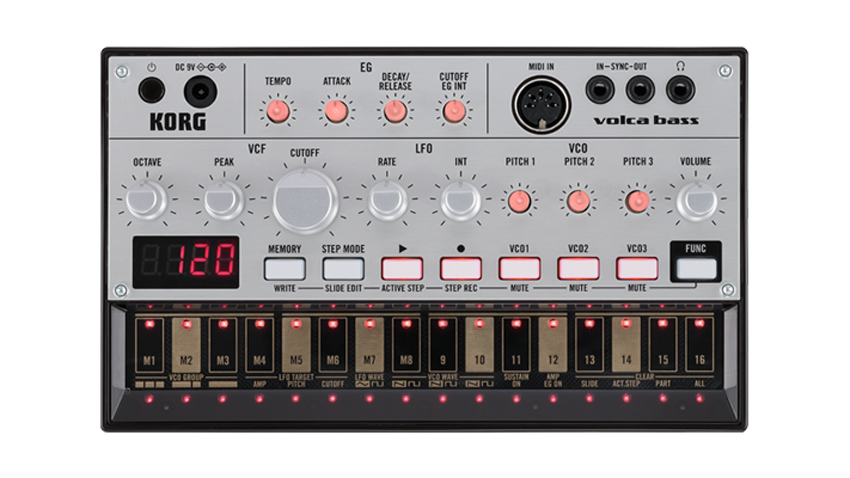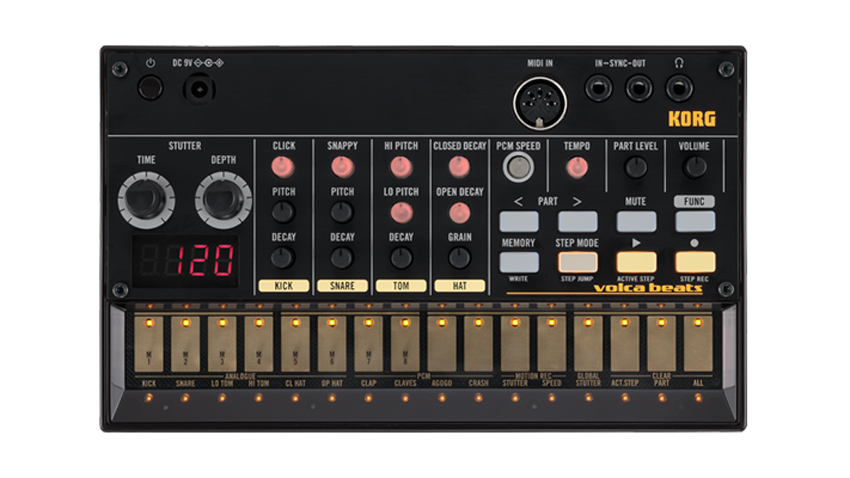Musikmesse 2013: Korg Volca analogue grooveboxes unveiled
Update: Now with demo and hands-on video!

Korg Volca main

Korg Volca Keys

Korg Volca Bass

Korg Volca Beats
MUSIKMESSE 2013: If you've enjoyed Korg's Monotron and Monotribe products then you're probably going to fall head over heels for the company's new Volca series grooveboxes.
This comprises three products: Volca Keys is a simple but supposedly powerful polyphonic analogue synth with loop sequencer; Volca Bass is a 3-oscillator analogue bass synth with an Electribe-inspired 16-step sequencer; and Volca Beats features analogue drum sounds inspired by classic rhythm machines and a 16-step sequencer.
Each of the instruments features MIDI IN - something that was sadly lacking on Korg's previous pint-sized synth offerings - and sync jacks. The Volcas can be battery powered and come with built-in speakers. They can be used individually or in combination.
Best of all, we hear that each Volca is set to sell for $150, which leads us to suspect that these things are going to fly off the shelves. Find out more below.
Korg Volca official details
Volca Keys
Analogue Loop Synth
The ideal introductory synthesizer, with a simple - yet powerful - polyphonic analog sound engine and loop sequencer
The polyphonic synthesizer you've been waiting for
Get the MusicRadar Newsletter
Want all the hottest music and gear news, reviews, deals, features and more, direct to your inbox? Sign up here.
- Three note true analogue synthesis
- Voicing function lets anyone create sounds easily
- Delay effect for even more sonic possibilities
Simple loop sequencer
- Loop sequencer lets you record phases just as you play them
- Motion Sequencer records knob edits in real time
- Active Step function and Flux function to add dynamic change to your sequences
Convenient functions for tremendous ease of use
- Self-tuning function for constant, stable pitch
- Sync In and Out allows clock sync of multiple instruments from the volca Series as well as Korg's Monotribe
- Compact size, battery-powered operation, and built-in speaker for enjoyment anywhere
Volca Keys is a long-awaited synthesizer that adds a new chapter to the long and storied history of Korg's analog synthesizers. This 27-key analog lead synth delivers unbelievably powerful sound in a compact body. Starting with a filter section that uses the circuitry of the legendary miniKORG700S (1974), it delivers astonishing sound that takes full advantage of Korg's half-century of know-how in circuit design.
With a simple structure that includes delay effect and a sequencer, it's also an ideal choice for a first analog synth. It offers the richly expressive sounds that are distinctive of analog, providing the enjoyment of simple yet deep sound-creation. The possibilities are endless; you can use the three oscillators to play chords, use them in unison with detune to produce solid lead lines, or apply ring modulation to create far-out metallic sounds.
Volca Bass
Analogue Bass Machine
Powerful analog bass sound creation and an Electribe-inspired sequencer for the ultimate bass lines
Powerful analog bass sound
- Three analogue oscillators for thick, huge bass line
- Newly designed analog filter for crisp, bright response
- Simple structure with single VCF, VCA, LFO, and EG
Loop sequencer distilled from the Electribe series
- Electribe-style 16-step sequencer with eight memory patches
- Slide function that's indispensable for acid and other types of electronic music
- Active Step function generates new bass lines by removing or inserting steps
Convenient functions for ease of use
- Self-tuning function for constant, stable pitch
- Sync In and Out allows clock sync of multiple instruments from the volca Series as well as Korg's Monotribe
- Go-anywhere analogue: play anywhere with the built-in speaker and optional battery power
Aggressive sounds that stand up to the drums; fat sounds that support the rhythm; funky sounds that generate a groove - the volca Bass is an analog groove box that has what you need for a wide range of bass lines.
Although simple in structure, the analog sound engine has an unmistakable presence with subtle nuances that cannot be reproduced by a digital simulation; it's a great choice for acid house and many other styles of music. The step sequencer distilled from the Electribe is not only visually intuitive; it's also a powerful way to generate "free form" bass loops that will stimulate your inspiration.
Volca Beats
Analogue Rhythm Machine
Peerless beats generated by solid analog drum sounds and an Electribe-style sequencer
Powerful analog drum sounds
- Real analog sounds created with reference to classic rhythm machines
- Six editable analogue parts with one knob per function for easy editing
- Maximum effect from minimal parameters - a unique advantage of analog
- PCM sound engine expands possibilities when used with analog sounds
Loop sequencer distilled from the Electribe series
- Electribe-style 16-step sequencer with eight memory patches
- Stutter function generates repeated triggers that dramatically change the sequence
- Active Step function generates new bass lines by removing or inserting steps.
- Step Jump function instantly plays only the step you're pressing
Convenient functions for incredible ease of use
- MIDI In for note entry, plus external sync and control from your DAW
- Go-anywhere analogue: play anywhere with the built-in speaker and optional battery power
Even today, more than thirty years after the age dominated by analog synthesizers, we just can't let go of the sound of analog rhythm machines. Those thick sounds have the power to stand up to guitar and acoustic drums, and are still indispensable for track-making or live performance. The volca Beats gives you those analog drums plus the easy-to-use step sequencer of the Electribe; it lets you turn your inspiration into reality and generate beats with the best high quality sounds.



I’m the Deputy Editor of MusicRadar, having worked on the site since its launch in 2007. I previously spent eight years working on our sister magazine, Computer Music. I’ve been playing the piano, gigging in bands and failing to finish tracks at home for more than 30 years, 24 of which I’ve also spent writing about music and the ever-changing technology used to make it.









